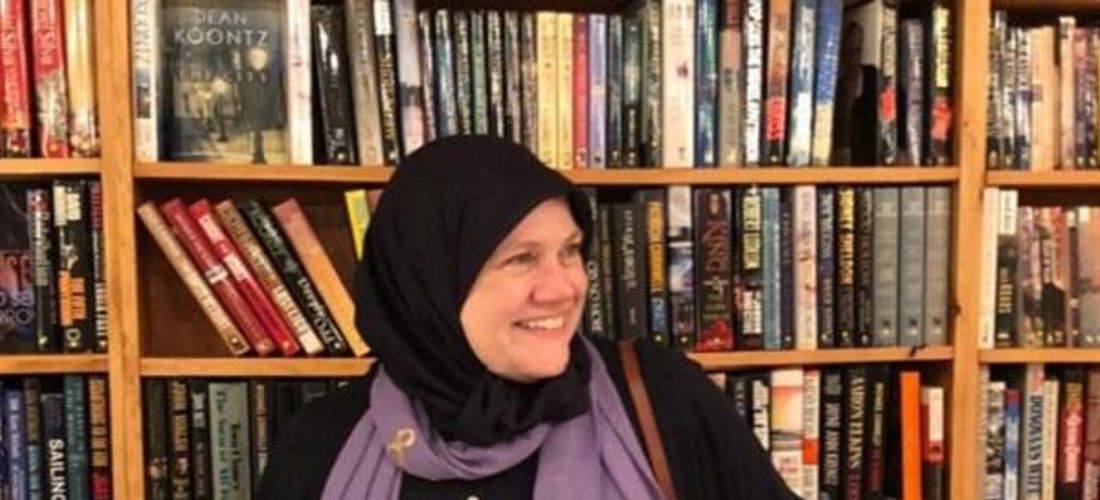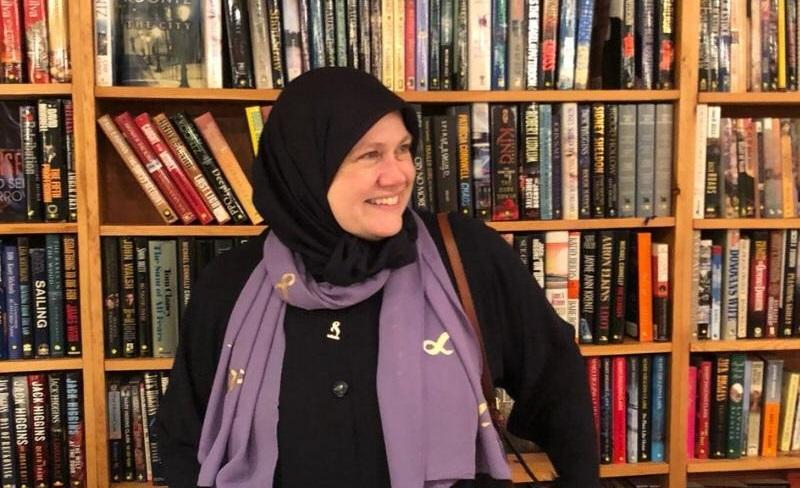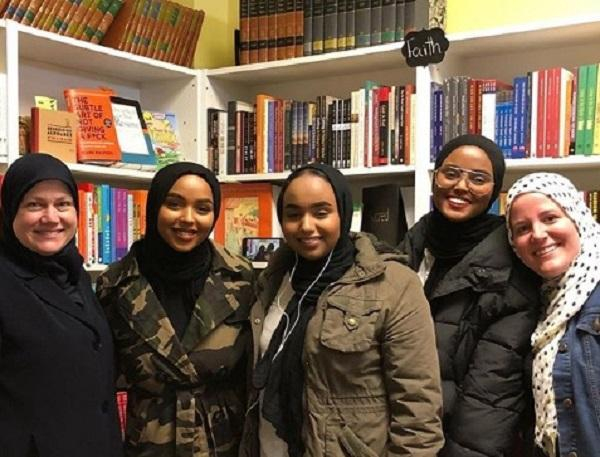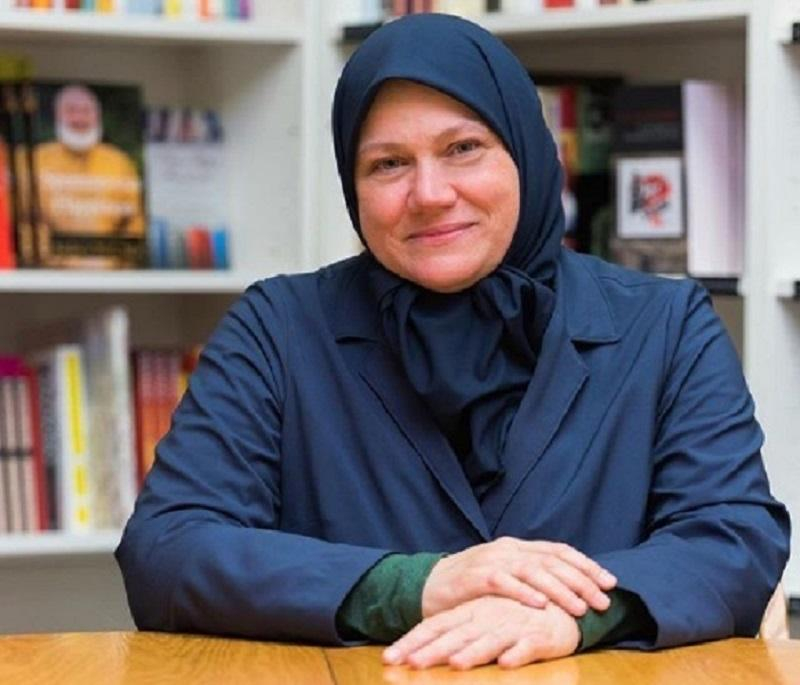Changing Views on Female Islamic Scholarship - Talking with Anse Tamara Gray
Lifestyle
|
Mar 28, 2019
|
11 MIN READ

Editorial note: In honor of Women’s History Month, we are asking ten questions to various leaders, authors, scholars and changemakers! Here, we are honoring Anse Tamara Gray! Anse Tamara is also our featured Changemaker for the first quarter of 2019! We will be featuring a Changemaker every quarter of the year. Also, check out other Women's History Month interviews with some phenomenal Muslim women here and here!
By Nargis Hakim Rahman
Female Islamic scholarship can often be an afterthought for women when they are bogged down by societal, cultural and family expectations and responsibilities. Many Muslim women would like to have a better grip on their Islamic knowledge to live more fulfilling lives. However, Islamic scholarship is overwhelmingly a space for men and boys. But, powerhouse Anse Tamara Gray aspires to change how women view Islamic scholarship through various avenues on the women-led platform, Rabata.org.
Rabata promotes positive cultural change through education experiences. Shaykha Tamara serves as the executive director of Rabata and oversees several of its projects, including Ribaat, the Joy Jots podcast and the Daybreak Press publishing house, which promotes and publishes literature by women.

She is an Islamic scholar, with multiple ijazas (certifications) in Islamic sacred texts and subjects, and a doctoral student at the University of St. Thomas for the Leadership, Policy and Administration program. Along with her work at Rabata, she is on the ISNA task force for masjid inclusion and an accomplished author and global public speaker for gender, leadership, Islam and spirituality.
I spoke with Anse Tamara about what motivated her to start Rabata, how she discovered the beauty of Islam through an interaction with Malaysian students and why Muslim women need to lead the charge in their masajid.
1. Who are your mentors - women or men who pushed you, uplifted you, challenged you to dig deep and do the hard work to help facilitate change?
I’ve had a number of mentors throughout my life:
Susan Imadi: I met her in 1985 when she was living in the U.S. at the time. It was not an easy place to be in 1985 as a convert and a woman. Susan had different things to say than what I heard from other people about being a Muslim woman. It was a very important period of my life [because] she gave me hope as a woman in Islam. I married her brother and eventually moved to Syria.
My family: I moved back to the U.S. in 2012. I came for a five-month break from the war in Syria, and I wasn’t intending to move here. There was a lot of grief with my new life and the war. During that time, my family rallied around me and gave me the feeling of, “We’re here for you,” which was really important to me as a convert. I felt that I [had been] away from my family for 20 years in Damascus, and I wanted to be here with my family in Minnesota.
Muslim women: I decided to stay for another year after initially coming back. I went on a tour across the U.S. and met Muslim women through my students from Syria. My passion was really for living Islam in a beautiful way. I remember standing in my living room and asking myself, “What am I going to do here?”
At that moment, I really made a decision to start Rabata online. That was based on a lifetime of mentorship and reading about women in the past in the world who devoted themselves to community. I had this intuitive feeling based on a long life of knowing people who had made decisions that weren’t necessarily easy, but they felt that something had to be done in their communities.
Professionals: I am just finishing my doctorate. I got support and encouragement in exploring what leadership meant in my context [at a Catholic university]. I’ve grown incredibly at the University of St. Thomas and did not face the usual religious discrimination. The university let me advise and lead their students.
2. What constitutes success in your line of work and/or activism? We all face numerous challenges along the way. How do we know when we're achieving success and making a difference?
You know success when you see it, such as when there is positive change or your family is happier.
In Muslim communities, success is when a woman finds joy and happiness in her life whether she’s a mom or a community member. She is able to connect to the Prophet Muhammad sallahu wa alliyhi salam, and she is not tied to rhetoric that excludes her. Women should have the ability to access religious literacy to live a beautiful life. I would like to see an increase in female mentors who are well read, have deep knowledge of religions, have beautiful lives and are able to help other women around them. The more we have that, we will have Islamophobia disappearing, better mosques and a happier society.
Success is also when women do not feel stress and anxiety in the mosques. There is a danger of women losing faith because they are not welcome in the mosque. This will impact the youth and families. We have to fix one mosque at a time and start with an attitude of change. Women should feel excited to go to the mosque. So many women are unmosqued.
In Islam we have the concept of ta’lif, which is to come to Islam as you are in your faith, to give mentorship and companionship to each other to attain the pleasure of Allah. I believe in our community and the power of voice and discussion. The more we talk about this experience of the mosque, we will find that people are unaware of how much architecture and way of doing things affects the larger community.3. I’ve read that you discovered Islam through Malaysian students. How did that shape your journey into Islamic scholarship and service?I met nine Malaysian students in the 80s after I became Muslim. I knew nothing [back then]. They took me under their wing. They were such beautiful women. They invited me to move in with them. They prayed Isha, and I prayed with them. [After I thought I was finished praying], I took off my prayer clothes. One of them said to me, “Aren’t you going to pray witr, the prayer after Isha?” I was an 18 year old who didn’t like to admit I didn’t know things.I didn’t say anything. I just looked at her. She answered herself and said, “Well you pray witr after tahajjud?” She asked, “Should I wake you?” I said, “Yes!” Before I learned fiqh, I learned so much about the spiritual world from them. Recently I went to Malaysia, and we got reconnected after 30 years.
Rabata started informally when I lived in Syria. I met some young women who wanted to be students. We created this idea, Rabata, as a moment of bringing people together. This was a way for me to connect with people while I lived overseas. When I came to the U.S. I had the opportunity to formalize it. It was very important to me to create cultural change, educate women and publish books, because historically we don’t have a lot of writing by women. If we can change things on the front of history, we can change it looking back. Program curriculum is important as well. We are creating curriculum and teachers’ guides that go with our books.
I want people to think of scholars as mentors. How do we become mentors to ourselves and grow spiritually? What is the tarbiya (upbringing) that makes us women of ihsan carrying the light and intentions of the early Muslim community? These are the ideas that started Rabata. It moved like wildfire because of the need. Now there are online classes, retreats, workshops and publishing.We can’t create change on one front. We have to be flexible in thinking of different aspects of cultures. We’re doing chapters of Rabata now as well. I believe in the third space. I also believe in coming together offline to create change and make a lot of people's lives better.
5. What were some of your biggest challenges you faced while starting Rabata?I entered a field I knew nothing about. I was an administrator in the schools, I was a student and later a teacher of Islam. I was never a nonprofit manager or director. Neither was I ever on a board. I wasn’t familiar with the nonprofit world.
I knew I had to do Rabata well and with responsibility. Minnesota has a number of nonprofits and development resources. I took classes. I had to crossover and make it a viable organization that leaves a legacy and helps Muslim women continuously.
6. What would you like young women to learn from your hard work at Rabata?I would like them to learn a couple of things:
We have seasons of life. Rabata has only been a nonprofit for five years. Sometimes it’s hard to enjoy children and not feel like we are missing out [on other opportunities]. This whole thing happened when I was 47 years old. Prior to this I had lived a whole life - and even a couple of lives - as a mother of young children and a young teacher. Know that our lives happen in stages. Prepare now for any possibilities that may come later.

I wasn’t prepared to be a nonprofit founder, but I prepared to be courageous and for religious knowledge. I filled out the details later. I want people to know that as an organization, we are here for you. We really want to provide and fulfill the needs of the community. I want to hear personally from you.
We would like to provide Islamic education to school teachers. For example, a teacher may have experience of teaching but not have had gotten the experience of Islamic studies in the classroom. We need to train our teachers and staff to bring the culture of ihsan in schools rather than just a culture of halal and haram. We want them to gain skills to be filled with joy.
Muslims are good at humanitarian work, but we can't forget to build the lifestyle to build a society to continue the humanitarian efforts that we do. We have to collaborate with other organizations to make it even better. For example, with the book, “Kan Ya Man Kan: Syrian Folktales & Recipes,” we shared 10 percent of the proceeds with a women-led organization for Syrians in America. The organization made recipes from the book for an event that emphasized our shared humanity. We made new friends and set an example for the youth.7. Being a Muslim woman in this day and age comes with numerous challenges - who are some good female sahaba role models we can look to to help guide us in our challenges?Everyone should read and learn from the lives of the women companions. All of the companions are worthy of being learned. Here are a few who come to mind:
Nusaybah bint Ka’ab: She was there during the second pledge of Al-Aqabah when the people of Madinah promised their faith and absolute loyalty to the Prophet Muhammad sallahu wa alliyhi salam, even if it meant war. She kept the promise of, “I will always be there.” She had great courage and commitment. She defended the Prophet Muhammad sallahu wa alliyhi salam during the Battle of Uhud and upheld his principles after his passing. She took great care of her community. We need to get some spine back like her.Umm Waraqa: Her life was as a woman of Qu’ran. She lived at the time of the Prophet sallahu alayhis salam. He used to pray at her home. It is debated whether or not she led prayer in her home. The Prophet sallahu alayhis salam gave her home a muezzin and the status of a mosque.As-Shifa: She was a healer, teacher, doctor and activist. She was committed to helping her community. Prophet sallahu alayhis salam saw this in her and asked her to teach others in Madinah to read and write.It is a blessing to see different personalities in Islamic history. There's not one personality we have to be. We should have courage and commitment and be sure of ourselves. Muslim women today are not so sure of themselves. We should not be like cooked macaroni noodles. We need to put some seal in our spine, courage in our gut, expand out and stand up and be known.
8. What are five tips you’d give to women who are struggling with their Islamic Identity?
Subscribe to be the first to know about new product releases, styling ideas and more.
What products are you interested in?

